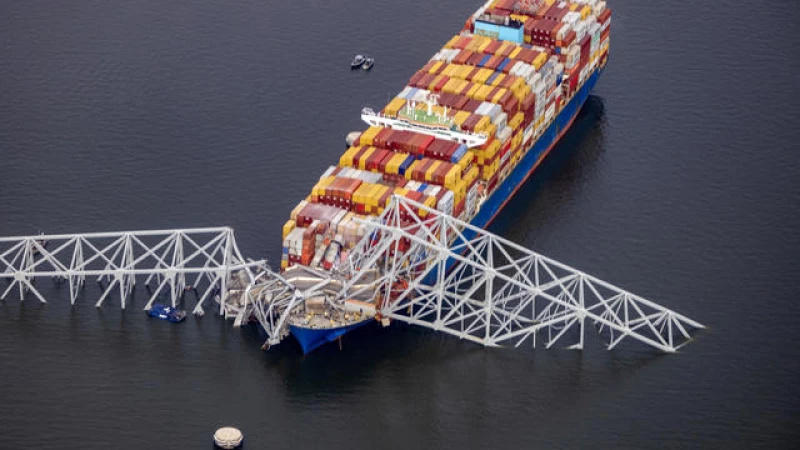Businesses and workers that provide services based on the Baltimore port's maritime activities are already feeling pain with all vessel traffic suspended after the Francis Scott Key Bridge collapse.
Theresa Abel, operations manager for Davis Ship Service, a logistics company that offers garbage removal, engine part replacements, and other vessel support services at the port, told CBS MoneyWatch that 100% of her company's work is tied to the port.
For decades, Abel received a steady flow of calls and emails from vessel operators seeking out the company's services. Now, the phones are silent. "It's almost scary how quiet it is. We have no emails, no phone calls," she said.
The 10-person company's warehouse stores ship parts for incoming vessels, and she expects it to be empty by the end of the week, with vessels at sea diverting to nearby ports and no new orders coming in.
"Now that they've been diverted, I'm sending shipments out. I sent four or five boxes to New York yesterday," Abel said.
Davis Ship Service is still working on a handful of ships that were already docked at the port of Baltimore when the bridge collapsed. "They need stuff, they'll have to have their sewage pumped off while they are here, but it's very quiet," she said.
Michael Moss, owner of Moss Marine, another small business that performs technical repairs on ships at the port, said that "if ships don't come in, then my market is not there."
He said he could be tapped to help make repairs to the Dali, the ship that crashed into the Key Bridge.
"They will need to spend some money in the port before they leave to make it safe to travel. They're going to have to do something in my arena, whether I am the contractor or somebody else," he said. Otherwise he expects to be called to other nearby ports to service ships, requiring him to travel, and making his services more expensive to clients.
"It will cost more for them, because I have to travel. It's an inconvenience," he said.
Bigger disruption than COVID-19
Indeed, every business at the port of Baltimore will be "severely challenged" by the bridge collapse, Maryland Senate president Bill Ferguson told CBS MoneyWatch Wednesday.
Ferguson referred to the event as the port's version of a "global pandemic," comparing the potential upheaval to the impact on businesses and employment during COVID-19, which had severely disrupted supply chains.
The Impact of Baltimore's Port Shutdown on Jobs and Businesses
The port's operations directly support 15,000 jobs. Indirectly, the port supports another 140,000 jobs in hospitality and other industries, making it a major economic engine for the region. Port workers are employed by different businesses, including trucking companies, container repair businesses, tug boat operators and more. The economic outlook for such businesses is grim, if they don't receive meaningful financial support fast.
"The range of businesses and jobs that will be affected is so unbelievably diverse," Ferguson said. "There are companies that fix the hinges on cargo containers, we have bay pilots, longshoreman and dockworkers. At this point, all of them are affected."
Unlike some industries and commercial operations, Baltimore's port was able to withstand COVID-19, because international commerce persisted. "The port still functioned and businesses related to it were deemed essential," Ferguson said. "But this shuts down international commerce for this region.'
Layoffs expected
Ferguson said he's spoken to small business owners who say they expect to have to lay off workers in the coming weeks, with no new business coming in.
"We are trying to put together legislation for small businesses like them that are trying to find a way to keep their workers on and utilize them even though the port is shut down," Ferguson said.
It's essential that they receive aid as fast as possible, too. "They can't wait, because the port is shut down today," Ferguson said.
The collapse of the bridge has prompted Ferguson to reconsider the significance of the port to the region. "We take it for granted sometimes because it's always just there, and now it's not," he said.
Carnival, a cruise line operator, informed shareholders that it could face a potential loss of up to $10 million in earnings due to the collapse. Additionally, a workers union expressed concerns that thousands of its members could be at risk of losing their jobs.
Scott Cowan, the president of the International Longshoreman Association's Baltimore local, revealed to WTOP news that 2,400 ILA members "are soon going to be without jobs."
To address the crisis, Maryland lawmakers are currently working on emergency legislation that would offer direct support to affected businesses. One crucial aspect of the proposed legislation is to provide incentives to port-related businesses to encourage them to remain in Baltimore, as highlighted by Ferguson.
No Significant Impact on U.S. Economy
Although the bridge collapse is expected to have a substantial impact on the local economy, it is unlikely to significantly affect the overall U.S. economy.
"Nevertheless, since that port is the 15th largest in the country, handling only 1.5% of total nationwide container traffic, even an extended closure wouldn't have any impact on either GDP or inflation," Capital Economics chief North America economist Paul Ashworth said in a research note.







